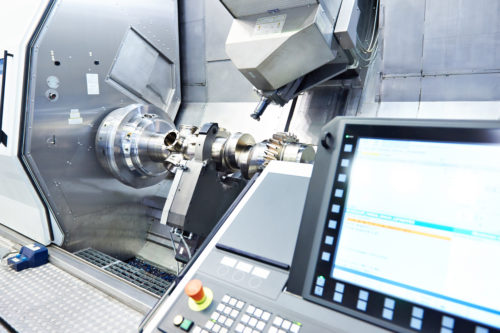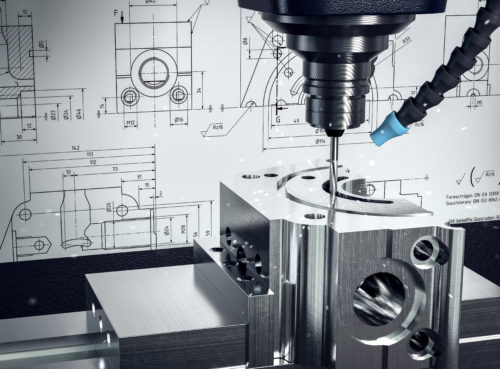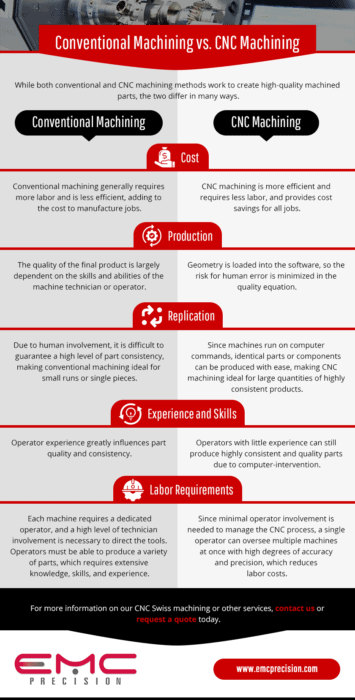Machining is critical to the manufacturing of products used across multiple facets of daily life. This controlled process involves using power-driven machine tools to cut raw material from a workpiece to produce the desired shape and size from materials such as metal, plastic, rubber, wood, paper, and more.
Machining can be described as conventional, which requires manual technician prompting and manipulation of the cutting tools, or non-conventional, such as CNC machining, which relies on computer automation to drive the process. While each approach offers distinct drawbacks and advantages, both aim to produce the highest quality machined parts.
What is Conventional Machining?
The conventional machining process uses a human operator to direct and control machining tools such as milling, boring, and drilling machines as well as lathes and other sharp cutting tools. This individual is responsible for driving the location and intensity of tool contact with the raw material through the use of buttons, levers, or wheels in order to achieve the intended product geometry.
What is CNC Machining?
Although CNC machining still requires operator oversight to manage software, functions in the CNC process are primarily carried out by pre-programmed computer designations that guide the movements of the machining tools. Tools used in the CNC process do not require contact with the raw materials.
Conventional Machining vs. CNC Machining
While both conventional and CNC machining methods work to create high-quality machined parts, the two differ in many ways.
Cost
- Conventional Machining. Conventional machining generally costs less and is more cost-effective and efficient for small jobs.
- CNC Machining. CNC machining is more expensive for small jobs, but provides greater efficiency and cost savings for larger jobs.
Production
- Conventional Machining. The quality of the final product is largely dependent on the skills and abilities of the machine technician or operator.
- CNC Machining. Geometry is loaded into the software, so the risk for human error is minimized in the quality equation.
Replication
- Conventional Machining. Due to human involvement, it is difficult to guarantee a high level of part consistency, making conventional machining ideal for small runs or single pieces.
- CNC Machining. Since machines run on computer commands, identical parts or components can be produced with ease, making CNC machining ideal for large quantities of highly consistent products.
Experience and Skills

- Conventional Machining. Operator experience greatly influences part quality and consistency.
- CNC Machining. Operators with little experience can still produce highly consistent and quality parts due to computer-intervention.
Labor Requirements
- Conventional Machining. Each machine requires a dedicated operator, and a high level of technician involvement is necessary to direct the tools. Operators must be able to produce a variety of parts, which requires extensive knowledge, skills, and experience.
- CNC Machining. Since minimal operator involvement is needed to manage the CNC process, a single operator can oversee multiple machines at once with high degrees of accuracy and precision, which reduces labor costs.
Due to improved product quality, highly consistent production replication, and reduced labor demands, CNC machining is the preferred manufacturing method in most instances.
 CNC Swiss Machining Services with EMC Precision
CNC Swiss Machining Services with EMC Precision
While both conventional and CNC machining methods seek to create quality products, the CNC process offers several advantages over its conventional counterpart. From improved product quality to increased labor requirements, CNC machining methods are ideal for large run projects that require high levels of quality and consistency.
At EMC Precision, our line-up of Swiss, multi-axis, multi-spindle, horizontal, and vertical machining centers allows us to provide customers with the versatility, productivity, and cost savings needed to tackle any job in industries like agriculture, government and military, medical devices and equipment, and more. Driven by our commitment to quality and safety, our team maintains ISO 9001:2015 and IATF 16949 certifications.
For more information on our CNC Swiss machining or other services, contact us or request a quote today.










